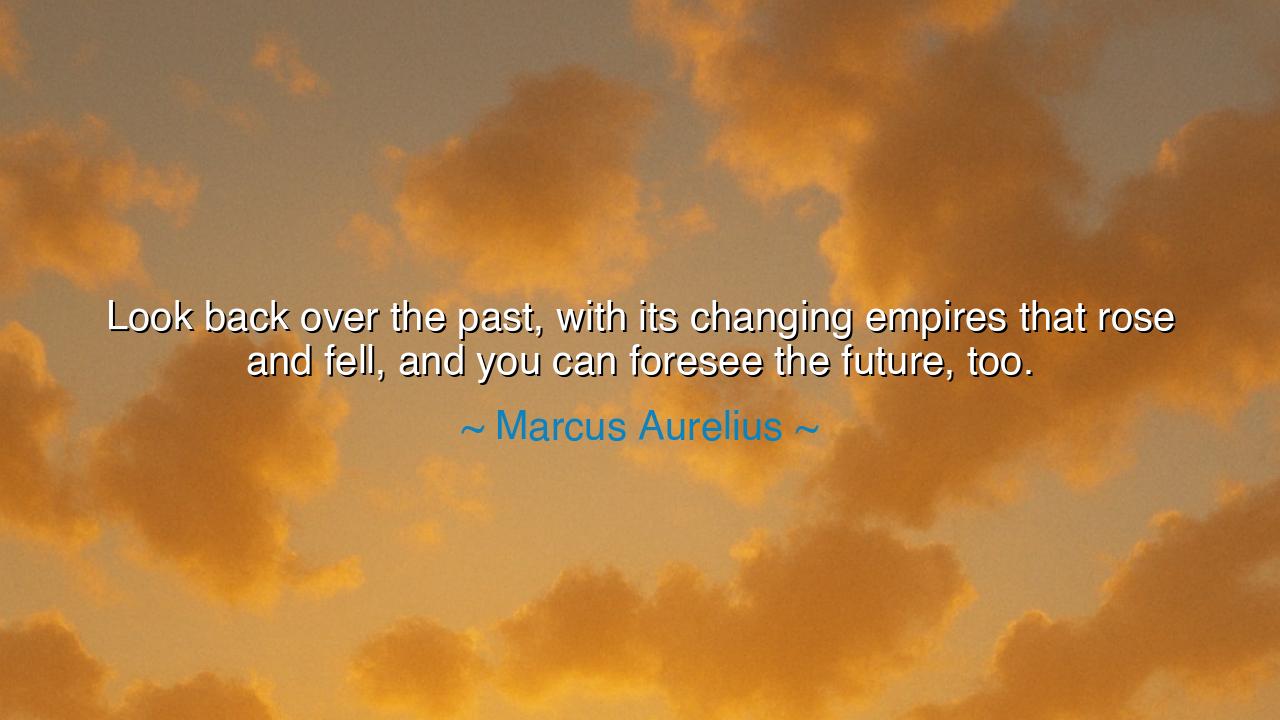
Look back over the past, with its changing empires that rose and
Look back over the past, with its changing empires that rose and fell, and you can foresee the future, too.






Marcus Aurelius, the Stoic philosopher and Roman emperor, speaks to us across the vast chasm of time. His words, "Look back over the past, with its changing empires that rose and fell, and you can foresee the future, too," echo with the weight of profound wisdom. What is this wisdom he offers? It is the understanding that history is not a distant past, a mere sequence of events forgotten by the march of time; it is a mirror in which we can glimpse the future, and in it, the lessons of the ages. Empires rise, they reach their zenith, and they fall, and from this, we must learn.
To look upon the past is to see the cycle of human ambition. Like the Assyrian Empire, which once stretched across vast territories, and the Roman Empire, which commanded the greatest known world of its time, all empires are marked by the same pattern. They are built on vision, strength, and unyielding will, yet they are also fragile, their foundations susceptible to the same forces that once brought them greatness. Aurelius calls us to recognize that these empires—whether they are civilizations, nations, or even the lives of individuals—do not remain untouched by time. What rises will inevitably fall, and what is built will be eroded by the relentless tides of change.
Let us reflect on the fall of Rome itself, a kingdom that, at its peak, held sway over vast territories, commanding both respect and fear. But it was not the might of Rome that caused its demise; it was the decay within. The great philosopher-emperor knew this truth well. It was not the external enemies alone—barbarians at the gates, invaders seeking conquest—but the internal collapse of values and cohesion that signaled the empire’s decline. His reflections serve as a warning to us all: we must never rest on our laurels, for history shows us that corruption and decay often lie within, waiting for the opportunity to strike.
In the age of Alexander the Great, we saw the rise of an empire that conquered and spread its wings across continents. His reign seemed indomitable, yet history reveals that the greatest of men, too, fall. The empire that Alexander created was divided upon his death, and its once glorious dominion fragmented into pieces. This serves as another testament to the cyclical nature of human endeavors. Aurelius teaches us that greatness is fleeting and often precarious. It is in understanding this that we can act with humility and foresight.
We must look at the current age and see how the patterns of the past persist. The rise and fall of empires is not just an ancient tale; it continues in our own time. The towering fortresses of corporations, the dominance of global powers, all stand as reflections of those ancient civilizations. Yet, like their predecessors, they are subject to forces both external and internal—corruption, hubris, and the inevitable passage of time. Aurelius urges us to take heed: what we see now has been seen before. If we wish to avoid the same mistakes, we must learn from history's lessons.
The lesson, then, is one of awareness and reflection. As we face our own challenges, whether they are in the realm of personal ambition, national power, or the collective fate of humanity, we must recognize the patterns that have shaped our world. We must learn to look upon the past not as a forgotten relic, but as a guide. The actions of those who came before us have carved the path we walk today, and in them, we can find the wisdom to navigate the future.
The clear lesson, then, is this: learn from history. Study the rise and fall of empires, and foresee your own future by understanding the mistakes and triumphs of those who came before you. Whether you are an individual striving for greatness or a society seeking to thrive, remember the impermanence of power and fortune. The cycle of rise and fall is unchanging. Let us act with wisdom, humility, and awareness, that we may be the exception, and not the rule. For it is not the fall itself that defines us, but how we learn from the past to create a future that endures.






AAdministratorAdministrator
Welcome, honored guests. Please leave a comment, we will respond soon